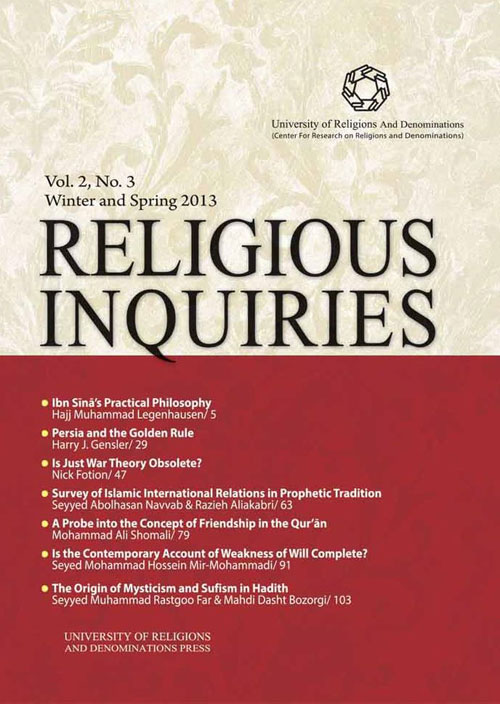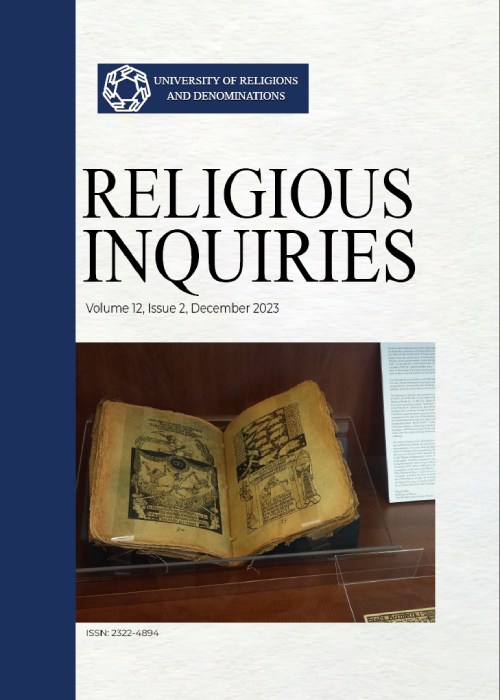فهرست مطالب

Religious Inquiries
Volume:2 Issue: 1, Winter and Spring 2013
- تاریخ انتشار: 1395/01/20
- تعداد عناوین: 7
-
-
Pages 5-27This article is a brief review of Ibn Sīnās practical philosophy. It begins with a discussion of the Platonic, Aristotelian, and Neo-Platonic influences on Ibn Sīnās practical philosophy, as well as the influence of Fārābī and of Islamic religious teachings. The creative synthesis invented by Ibn Sīnā requires a particular view of the relation between religion and philosophy in such a manner that religion shapes the direction of philosophical inquiry, and philosophy opens the way to a more profound and esoteric understanding of religion.Keywords: Aristotle, Avicenna, Ibn Sīnā Fārābī Ethics, neo, Platonism, Plato, Practical Wisdom, prophet, revelation, virtue
-
Pages 29-46My paper has two parts. First, I talk about the golden rule. After introducing the rule and its global importance, I explain why many scholars dismiss it as a vague proverb that leads to absurdities when we try to formulate it clearly. I defend the golden rule against such objections. Second, I talk about the golden rule in Persia and Islam; I consider Persian sources (Muslim and non-Muslim) and also non-Persian Muslim sources. I show that the golden rule is deeply rooted in Persia and Islam. And I point out special ways that this traditions understanding of the golden rule can contribute to those outside this tradition.Keywords: Golden rule, Persia, Islam
-
Pages 47-62Just War Theory can be found in almost all major cultures. But since war was a business that could not be easily stopped, some aimed to constrain it. In its classic form, Just War Theory has been around for several centuriesever since nationhood in Europe replaced provincial governments. Having made some introductory considerations, I will ask: should Just War Theory be left as it is, changed, or, possibly, be completely abandoned? I will discuss the issue of the theorys logicality first, and then move to the question of how technologies might force us to redo or abandon Just War Theory. Finally, I will discuss how changes in political life might prompt us to change the theory as we in the West have known it for several centuries.Keywords: Just War Theory, Jus ad bellum, Jus in bello
-
Pages 63-78Islam as a universal religion has a special approach for establishment of international relations. Different dimensions of this approach can be found in the accounts of the Prophets (s) interactions with other nations. Theoretical foundations of Islamic international relations, inspired by Quranic principles, have consolidated the mechanism of these relations in practice. Meantime, a survey of Islamic international relations in the context of prophetic tradition can provide a paradigm for the contemporary Islamic community. The present research has employed an analytical-descriptive method to explore the vision of the holy prophet of Islam for Islamic international relations. The paper further highlights the guidelines the Prophet (s) applied to actualize the fundamental ideals of Islam. Recent studies indicate that the Prophet (s) respected the principles governing the international relations, considering the precepts to be requisite to build up a world in which all nations would live peacefully with mutual understanding and active cooperation. As such, he made special efforts so that Islamic international relations would come to fruition and acquire a position of prime importance. This paper aims at explicating the tansnational activities of Prophet Muhammad (s), a topic that has rarely been studied in the history of international relations.Keywords: Holy Prophet (s), prophetic conduct, international relations, religions, Islam
-
Pages 79-90The topic of human relationshipsbe they positive and sympathetic, or negative and hostilereceives a great amount of attention in the Qurān. Human beings need to be aware of both their friends and their enemies in order to learn how to engage with both groups, how to make additional friends and defend themselves from harm caused by enemies, and, if possible, turn these enemies into friends. There are several concepts used in the Qurān to refer to the general notion of friendshipa relationship that is positive, constructive, and sympathetic. Starting with an analysis of the concept of spouse (zawj) and then focusing on five other concepts (ṣāḥib, khalīl, akh, ṣadīq, and walī) used in the Qurān to refer to friendship, I will try to explore their distinctive features as well as their similarities.
-
Pages 91-101Before an outstanding article in 1999 by Richard Holton, weakness of will was identified as an agent's action contrary to his or her better judgment, while other better choices are available. The contemporary account of weakness of will (i.e., Holtons theory) explains it in terms of intention. Accordingly, weakness of will happens if an agent fails to stick to his or her previously formed intention unreasonably while he or she should. However, this account fails to explain all cases of weakness of will and never takes into account the different types of reasonable judgments as found in deontological theories. This paper suggests that although weakness of will can be explained in terms of intention, the object which the will refers to plays a key role in identifying a complete understanding of weakness of will.Keywords: Akrasia, weakness of will, Richard Holton, the empirical will, the pure will
-
Pages 103-117Islamic mysticism or Sufism is one of the most outstanding appearances of Islamic culture that has had a fundamental and undeniable role in the history of Islam. A careful study of the history and development of the movements of Islamic culture shows that this movement, like most other ones, has been originated from, developed, and cultivated in an Islamic environment, though it has undoubtedly been affected by Hellenistic, Christian, Iranian, and other cultures in its historical process. The purpose of this article is to show the origin of Islamic mysticism and Sufism in Hadith through citing examples of some hadiths of the holy Prophet (s) and Imam ʿAlī (a) that clearly represent some mystical beliefs, methods, principles, and practices. It will be proved that in the early sources of Islam, especially in hadith sources, there have been abundant grounds for the emergence of Islamic mysticism and Sufism, without any need for other cultures. Proving this point, we reject the view that Islamic mysticism has originated from foreign cultures.Keywords: The Origin of Islamic Sufism, Hadith, piety, asceticism, remembrance, self, knowledge, forty days seclusion


